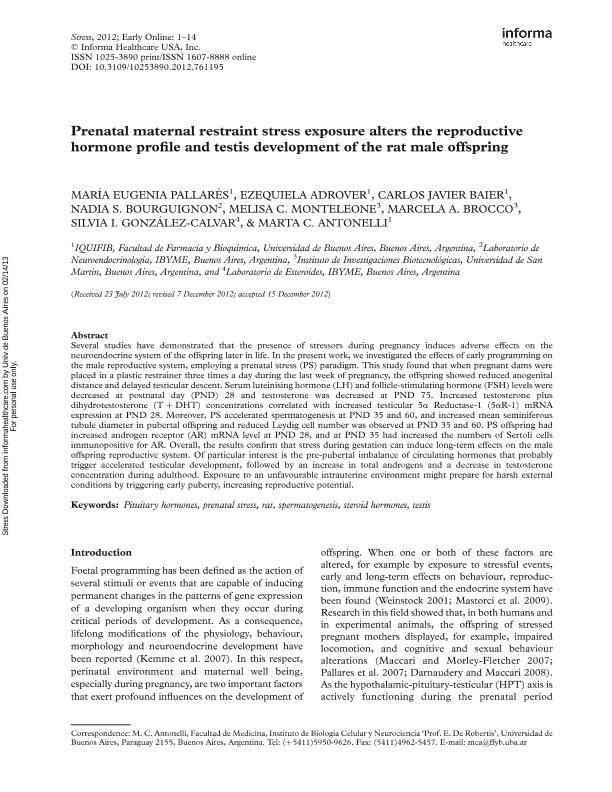Artículo
Prenatal maternal restraint stress exposure alters the reproductive hormone profile and testis development of the rat male offspring
Pallares, Maria Eugenia ; Adrover, Ezequiela
; Adrover, Ezequiela ; Baier, Carlos Javier
; Baier, Carlos Javier ; Bourguignon, Nadia
; Bourguignon, Nadia ; Monteleone, Melisa Carolina
; Monteleone, Melisa Carolina ; Brocco, Marcela Adriana
; Brocco, Marcela Adriana ; Gonzalez Calvar, Silvia I.; Antonelli, Marta Cristina
; Gonzalez Calvar, Silvia I.; Antonelli, Marta Cristina
 ; Adrover, Ezequiela
; Adrover, Ezequiela ; Baier, Carlos Javier
; Baier, Carlos Javier ; Bourguignon, Nadia
; Bourguignon, Nadia ; Monteleone, Melisa Carolina
; Monteleone, Melisa Carolina ; Brocco, Marcela Adriana
; Brocco, Marcela Adriana ; Gonzalez Calvar, Silvia I.; Antonelli, Marta Cristina
; Gonzalez Calvar, Silvia I.; Antonelli, Marta Cristina
Fecha de publicación:
02/2013
Editorial:
Taylor & Francis Ltd
Revista:
Stress
ISSN:
1025-3890
Idioma:
Inglés
Tipo de recurso:
Artículo publicado
Clasificación temática:
Resumen
Several studies have demonstrated that the presence of stressors during pregnancy induces adverse effects on the neuroendocrine system of the offspring later in life. In the present work, we investigated the effects of early programming on the male reproductive system, employing a prenatal stress (PS) paradigm. This study found that when pregnant dams were placed in a plastic restrainer three times a day during the last week of pregnancy, the offspring showed reduced anogenital distance and delayed testicular descent. Serum luteinising hormone (LH) and follicle-stimulating hormone (FSH) levels were decreased at postnatal day (PND) 28 and testosterone was decreased at PND 75. Increased testosterone plus dihydrotestosterone (T+DHT) concentrations correlated with increased testicular 5-alpha Reductase-1 mRNA expression at PND 28. Moreover, PS accelerated spermatogenesis at PND 35 and 60, and increased mean seminiferous tubule diameter in pubertal offspring and reduced Leydig cell number was observed at PND 35 and 60. PS offspring had increased androgen receptor (AR) mRNA level at PND 28, and at PND 35 had increased the numbers of Sertoli cells immunopositive for AR. Overall, the results confirm that stress during gestation can induce long-term effects on the male offspring reproductive system. Of particular interest is the pre-pubertal imbalance of circulating hormones that probably trigger accelerated testicular development, followed by an increase in total androgens and a decrease in testosterone concentration during adulthood. Exposure to an unfavourable intrauterine environment might prepare for harsh external conditions by triggering early puberty, increasing reproductive potential.
Palabras clave:
Pituitary Hormones
,
Stress Prenatal
,
Rat
,
Spermatogenesis
,
Steroid Hormones
,
Testis
Archivos asociados
Licencia
Identificadores
Colecciones
Articulos(IBCN)
Articulos de INST.DE BIOLO.CEL.Y NEURCS."PROF.E.DE ROBERTIS"
Articulos de INST.DE BIOLO.CEL.Y NEURCS."PROF.E.DE ROBERTIS"
Articulos(IBYME)
Articulos de INST.DE BIOLOGIA Y MEDICINA EXPERIMENTAL (I)
Articulos de INST.DE BIOLOGIA Y MEDICINA EXPERIMENTAL (I)
Articulos(IIB-INTECH)
Articulos de INST.DE INVEST.BIOTECNOLOGICAS - INSTITUTO TECNOLOGICO CHASCOMUS
Articulos de INST.DE INVEST.BIOTECNOLOGICAS - INSTITUTO TECNOLOGICO CHASCOMUS
Articulos(SEDE CENTRAL)
Articulos de SEDE CENTRAL
Articulos de SEDE CENTRAL
Citación
Pallares, Maria Eugenia; Adrover, Ezequiela; Baier, Carlos Javier; Bourguignon, Nadia; Monteleone, Melisa Carolina; et al.; Prenatal maternal restraint stress exposure alters the reproductive hormone profile and testis development of the rat male offspring; Taylor & Francis Ltd; Stress; 16; 4; 2-2013; 429-440
Compartir
Altmétricas



